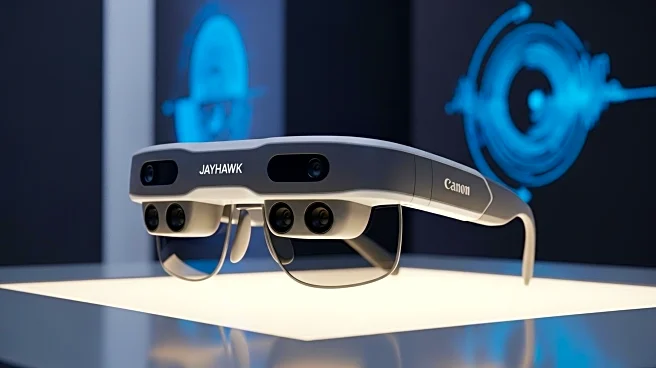What's Happening?
Amazon is advancing its consumer technology offerings with the development of augmented reality glasses, codenamed Jayhawk, set for a rollout in late 2026 or early 2027. These glasses will integrate Amazon's logistics expertise, potentially transforming shopping experiences by incorporating features such as shopping guides, maps, and voice AI into a wearable screen. The Jayhawk glasses will include a microphone, speaker, camera, and a full-color display in one eye, aiming to enhance user interaction with product information and live deals. This move signifies Amazon's shift from backend services to visible consumer hardware, raising questions about privacy and retail power dynamics.
Why It's Important?
The introduction of Amazon's Jayhawk glasses could significantly alter the retail landscape by changing how consumers interact with products both in-store and online. By providing guided product information and voice ordering capabilities, these glasses could influence impulse buying and search behaviors, prompting retailers to rethink their strategies for product discovery and inventory management. The timing of the rollout coincides with peak shopping periods, potentially affecting holiday sales if Amazon successfully integrates ergonomics and AI. This development also positions Amazon in direct competition with other tech giants like Meta and Ray-Ban, who are accelerating their own AR initiatives.
What's Next?
As Amazon prepares for the Jayhawk rollout, industry reactions remain cautious, with analysts highlighting user comfort and style as potential adoption hurdles. The early deployment of delivery-worker glasses in Q2 2026 will shape consumer rollouts and developer support. Developers will gain a new input surface for shopping apps and spatial ads, while advertisers may invest in appearing in AR overlays. This could lead to faster in-store conversions and voice-driven purchases, potentially reducing traffic to independent search platforms and increasing personalized, location-based advertising.
Beyond the Headlines
The integration of augmented reality into everyday shopping experiences raises ethical and privacy concerns, as consumers may face constant purchase prompts in their field of view. The shift towards Amazon-first discovery could impact independent retailers and alter consumer behavior, making every shopping outing feel like a demo. As AR technology becomes more prevalent, the balance between convenience and privacy will be a critical consideration for both consumers and businesses.









